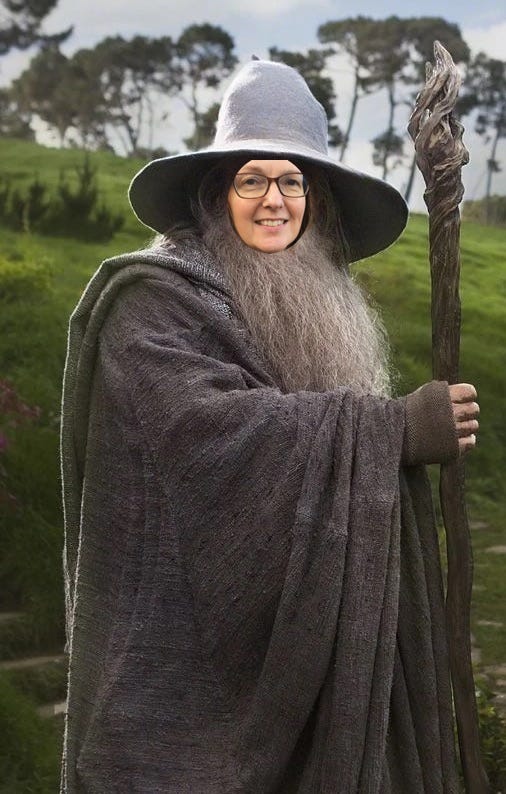Getting this post ready to publish made me realise how far I’ve come. By and large, I’m accepting of this groovy walk of mine and the shit that comes along with MS. And I have acquired a fine fleet of mobility aids to help me. It wasn’t always like this.
During the Covid pandemic I started to notice some unwelcome changes to my MS. I’m not sure exactly when it began. But sometime between the beautiful but bogus stories of swans and dolphins returning to deserted Venetian canals, and facemasks being abandoned like yesterday’s trash, multiple sclerosis started to poke me in the ribs and remind me that it might not be letting me off so lightly.

My mobility was deteriorating. My spasticity getting worse. What was driving these changes? The relative inactivity and stress of lockdown? The impact of a couple of nasty infections? Or just plain old disease progression, not unexpected with a chronic illness like multiple sclerosis? Due to Covid restrictions, access to my Neurologist was severely limited so my questions remained unanswered. It was probably a grim combination of all of those factors.
To an observer, I’m not sure how things seemed. Was I coping? When I look back, I imagine some sort of invisible, bewildered and fear-filled fog following me around. And I was struggling, not only with the challenges of the physical changes, but the emotional impact of dealing with a body that was letting me down.
I didn’t know what to do with this state of affairs. I started hanging out in MS forums, seeking out blogs and Instagram feeds of people with MS and other disabilities. There was chat about mobility aids, and here was a community, armed with their mobility devices, a tongue-in-cheek hashtag #babewithamobilityaid and a fuck you attitude. Showing the world that mobility aids are empowering rather than tragic, and could be stylish and cool rather than clinical and functional. They were largely younger, much braver than me, and that made me feel like a big baby #bigbabywithoutamobilityaid. Part of my brain wanted to join their party, but all I could do was put the invitation to one side.
⭐️ Did I need a mobility aid? I was hobbling, in a very obvious and pretty unsafe way, but when I moved around I didn’t use a rollator, cane or wheelchair to help me. ⭐️
At home I relied on my walls and furniture to steady me. Brown-grey fingermarks started to appear on the paintwork, adding grubby décor vibes around four foot level. Like I had some sticky oversized three-year old living there. My daughter was twelve, and taller than me so I couldn’t blame her.
Any time I ventured outside on foot alone, a little trip to my go-to coffee place, for example, was like some sort of disability Parkour competition with myself: hang on open car door; hobble two feet to stone wall prop; glide along wall to concrete pavement bollard; grip on barber shop window ledge, and the finale, the prize: the outside seat and the Flat White trophy. And for a time, this was better than accepting the limitations of my body and dealing with the social stigma and attention drawing nature of a mobility aid.

Accepting change can be hard, and sometimes when the losses and changes are too difficult to bear, it can be helpful to hang out in the handy hidey-hole of denial for a while. The textbooks tell us denial is a useful defence mechanism helping to give ourselves time to process difficult or stressful situations*. It’s certainly somewhere I go to help me feel safe.
About 6 months after my diagnosis and with a show of indignation, I filled out and dutifully sent off my blue badge application (UK accessible parking permit) as my MS nurse advised. I had a warped, dreamy hope that it might be returned stamped in red ‘REJECTED’, or even better ‘IMPOSTER’ or ‘FRAUD’. So I had form with denial.
And denial is somewhere I’ve returned, to help me cope with change. When it came to dealing with my worsening mobility and the changes in my body, denial was helpful to a point. But staying there started to mean compromising my own safety, and being at home more often than was good for my mental health. I guess the harm creeps in when you get stuck there. Once I realised it was ok to sit with the grief and not push things, I gave myself time to process. And there was a lot here, it felt complicated. I was struggling with feeling different. I started to feel like I didn’t fit in anywhere and it was hard.
⭐️ I had so many thoughts buzzing around in my head. Bargaining: “Won’t the exercise programme I’m trying really hard with actually give me the mobility I need anyway?”
Or, dipping my toe in acceptance: “If you’re thinking you might need a mobility aid then you probably do need one.”
Next, a different flavour of fear: “What if using one makes me dependent on it?”
Then, and it turned out this was quite a biggie: “What would others make of seeing me like this, and what would I say if I bump into ‘so and so’ in the street and I’m using a cane or rollator?” ⭐️
I think I was more concerned by how I might navigate the awkwardness, possible pity, and elephant-in-the-roomness of these imagined encounters, rather than being truly bothered by what people thought, because I couldn’t control that. But I could try to control the narrative, take responsibility for protecting them from embarrassment, by knowing what to say. I rehearsed some dialogue:
⭐️ “Oh this, it’s a rollator, I’m just holding it for my Grandma.”
⭐️ “Yeah, walking poles, I’ve just got back from hiking Whernside.”
⭐️ “No, it’s not a walking stick, I am Gandalf.”
This needed some work.
Now this is where the denial gets even more messed up. I had already invested in an Alinker, the “is it a bird, is it a plane…” walking bike brought to the mobility aid world by Dutch inventor BE Alink. And I was somehow ok with going out on it. It was as if the “is it a bird… “ status I had given this awesome big yellow taxi of a contraption made me believe that it wasn’t seen by others as something that people with disabilities use. Plus, you can’t see the fancy walk when you’re on the Alinker.
And there was a lesson to be learned from this state of denial. I was going out for a coffee with Jase, we live on a hill, and it’s pretty steep. I had to push the Alinker up, rather than sit on it, which worked out well for me as I really did need it for balance and stability. Minding our own business, we were approached by an oncoming well-wisher, never met her before in my life:
“Oh, I’m guessing you’ve had some sort of an accident.?” She enquired.
Me: “Erm… no I have MS” (I will learn that I don’t have to disclose my medical details to strangers. )
“Oh I’m so sorry” she replied… “Oh you are so brave, whenever I see someone like you I feel really guilty about complaining about trivial things”. (WTF!)
The hindsight fairy might have had me say “Well, don’t complain then you dickhead.”
But, no, of course I didn’t say that. Instead, I absolved her of any bad feelings, got all relational, and said “well, we all complain about trivial stuff don’t we?”, before muttering something about looking forward to a coffee, and pushing on up the hill. People might say, she was only trying to be nice, in her own way, or maybe she was lonely, reaching out, and haven’t we all said cringeworthy things? And I get that. Framing things negatively was probably not helpful, those very sentiments occurred to me too, but ultimately one random stranger’s comments reduced me to nothing but my MS and all the crappy and pitying assumptions that can go along with disability. We were just going out for a coffee, that’s all, and it ended up not tasting so good.
The dust soon settled on this wounding encounter, and I chalked it up as something to learn from. It turned out I had already been using a mobility aid, a yellow wheelchair sized one. Hiding in plain sight. So, of course the Alinker is recognisable as a mobility aid. This would be great blog material.
When we got home my bright orange trekking poles had arrived in the post. Things were starting to shift.
And that’s how it continues. Shifting, mostly quietly, almost without a visible trace, occasionally with a fanfare. All the while there is coffee, and I can still take a dip in the river if I need to.
⭐️ Read my next post about how disability stigma made my journey as a mobility aid user harder than it needed to be.
⭐️ Read the one where I finally ‘come out’ as a mobility aid user.
Thank you for reading
Jane 💛
Footnote.
*Denial
n. A defence mechanism in which unpleasant thoughts, feelings, wishes, or events are ignored or excluded from conscious awareness. It may take such forms as refusal to acknowledge the reality of a terminal illness, a financial problem, an addiction, or a partner’s infidelity. Denial is an unconscious process that functions to resolve emotional conflict or reduce anxiety. American Psychological Association.
If you haven’t already, subscribe to get new posts directly to your email!
Know someone else who might be interested? You can share a link:
⭐️ To find out a bit more about me see the About section ⭐️








Perfect piece Jane. You've summed up all the thinking I've been doing re. transitioning to using a visible mobility aid. It's a big step to take, and it will come with at least one weird conversation with a stranger (why do humans do so much thinking out loud!!!).
First I wanted to say I adore your photos - the colourful watermark (I don’t know what else to call it) always makes me so happy!
Second - thank you for this heartfelt piece. I too have finger marks and scratches on my walls and furniture - and the odd blood stain from bad falls. It’s a reminder that I’m not steady… and try as I might to make things work I’m falling down more than I should be.
I always get back up - but surely it would be better to avoid the falling in the first place? What’s holding me back? Definitely concerns over feeling like a fraud. Stress over where I will put a large electric chair (my condo is barely 600 square feet) and denial that my condition has progressed this much.
I know it’s counterintuitive- but there’s a part of me that feels like as long as I don’t take that next step I can pretend that it’s “not that bad”. Kinda silly when you consider all the injuries I’ve had from falling down.
I take solace knowing I’m not alone - it sounds like most of us struggle with taking the plunge and accepting that we need mobility aids.